自考英语语法笔记1_第一章_绪论
自考英语(一)课堂笔记完整版(25)

自考英语(一)课堂笔记完整版(25)Unit13(第38讲—第40讲)Text A Imsurance本课主要单词1、insurance n. 保险;保险金fire (car,health,casualty )insurance 火(汽车,健康,伤亡变乱)险sell life insurance兜揽人寿保险生意insurance policy保险契约,保险单insurance company保险公司insurance agent保险代理人1)You will have to show your driving license and car insurance certificate.(你得出示你的驾驶证和汽车保险证明。
)2)The holiday cost 50 pounds plus insurance and airport taxes.(这次度假的代价是50英镑,另加保险费和机场税。
)动词insure和assure都可以指“给…保险”。
如:1)He insured his house against fire.(他给本身的房屋保了火险。
)2)The insurance company refused to insure him again after all his car accidents.(他的汽车出了那么多变乱以后,保险公司不肯再给他保险了。
)3)He assured his life with this company. (他向这家公司保了人寿险。
)assure还可以指“向…包管”,“使确信”。
如:1)She assured me that she would come earlier. (她向我包管她会早点来。
)2)I can assure you of the quality. (它的质量我可以向你包管。
)在美国英语中,insure可以表示“包管,确保”。
如:We must try to insure peace around the world. (我们必需确保世界和平。
自考英语本科 《现代语言学》 复习大纲
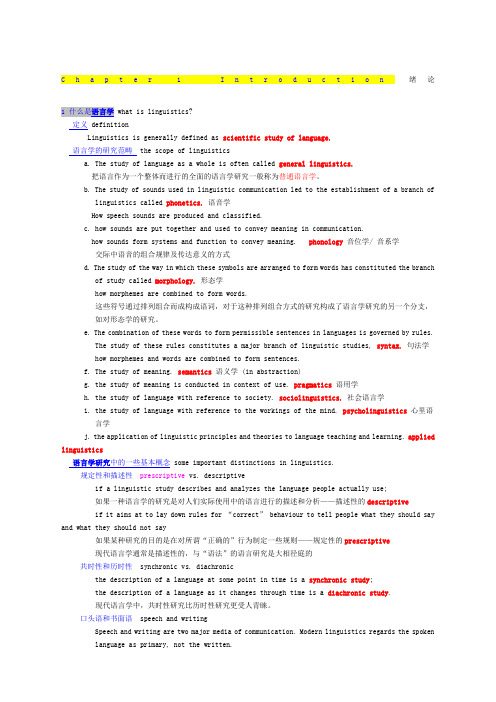
C h a p t e r1I n t r o d u c t i o n绪论what is linguistics?定义 definitionLinguistics is generally defined as scientific study of language.语言学的研究范畴 the scope of linguisticsa. The study of language as a whole is often called general linguistics.把语言作为一个整体而进行的全面的语言学研究一般称为普通语言学。
b. The study of sounds used in linguistic communication led to the establishment of a branch oflinguistics called phonetics.语音学How speech sounds are produced and classified.c. how sounds are put together and used to convey meaning in communication.how sounds form systems and function to convey meaning. phonology音位学/ 音系学交际中语音的组合规律及传达意义的方式d. The study of the way in which these symbols are arranged to form words has constituted the branchof study called morphology.形态学how morphemes are combined to form words.这些符号通过排列组合而成构成语词,对于这种排列组合方式的研究构成了语言学研究的另一个分支,如对形态学的研究。
自考英语专业综合英语笔记上册(第一课)
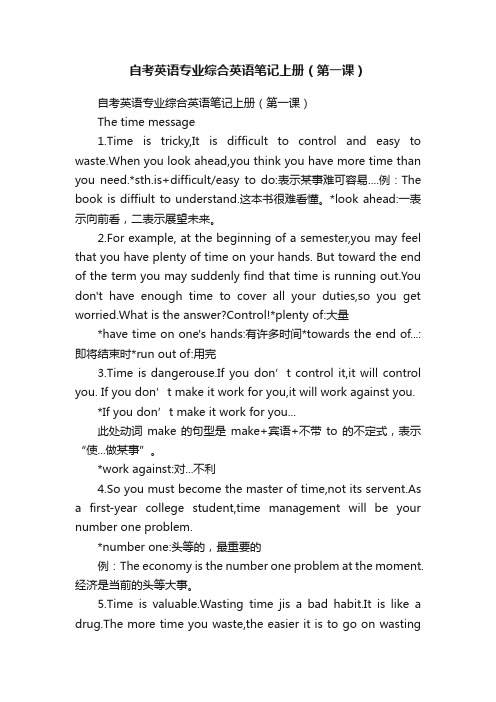
自考英语专业综合英语笔记上册(第一课)自考英语专业综合英语笔记上册(第一课)The time message1.Time is tricky,It is difficult to control and easy to waste.When you look ahead,you think you have more time than you need.*sth.is+difficult/easy to do:表示某事难可容易....例:The book is diffiult to understand.这本书很难看懂。
*look ahead:一表示向前看,二表示展望未来。
2.For example, at the beginning of a semester,you may feel that you have plenty of time on your hands. But toward the end of the term you may suddenly find that time is running out.You don't have enough time to cover all your duties,so you get worried.What is the answer?Control!*plenty of:大量*have time on one's hands:有许多时间*towards the end of...:即将结束时*run out of:用完3.Time is dangerouse.If yo u don’t control it,it will control you. If you don’t make it work for you,it will work against you.*If you don’t make it work for you...此处动词make的句型是make+宾语+不带to的不定式,表示“使...做某事”。
自考英语(一)课堂笔记完整版(33)
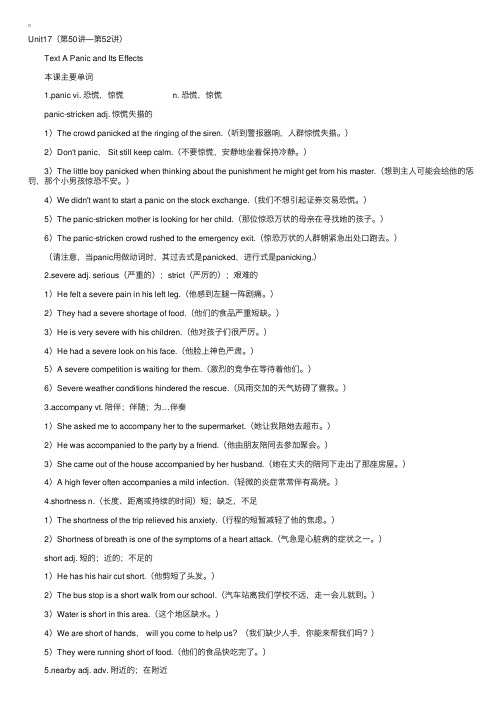
Unit17(第50讲—第52讲) Text A Panic and Its Effects 本课主要单词 1.panic vi. 恐慌,惊慌 n. 恐慌,惊慌 panic-stricken adj. 惊慌失措的 1)The crowd panicked at the ringing of the siren.(听到警报器响,⼈群惊慌失措。
) 2)Don't panic, Sit still keep calm.(不要惊慌,安静地坐着保持冷静。
) 3)The little boy panicked when thinking about the punishment he might get from his master.(想到主⼈可能会给他的惩罚,那个⼩男孩惊恐不安。
) 4)We didn't want to start a panic on the stock exchange.(我们不想引起证券交易恐慌。
) 5)The panic-stricken mother is looking for her child.(那位惊恐万状的母亲在寻找她的孩⼦。
) 6)The panic-stricken crowd rushed to the emergency exit.(惊恐万状的⼈群朝紧急出处⼝跑去。
) (请注意,当panic⽤做动词时,其过去式是panicked,进⾏式是panicking.) 2.severe adj. serious(严重的);strict(严厉的);艰难的 1)He felt a severe pain in his left leg.(他感到左腿⼀阵剧痛。
) 2)They had a severe shortage of food.(他们的⾷品严重短缺。
) 3)He is very severe with his children.(他对孩⼦们很严厉。
自考英语(一)英语语法笔记基础知识-代词
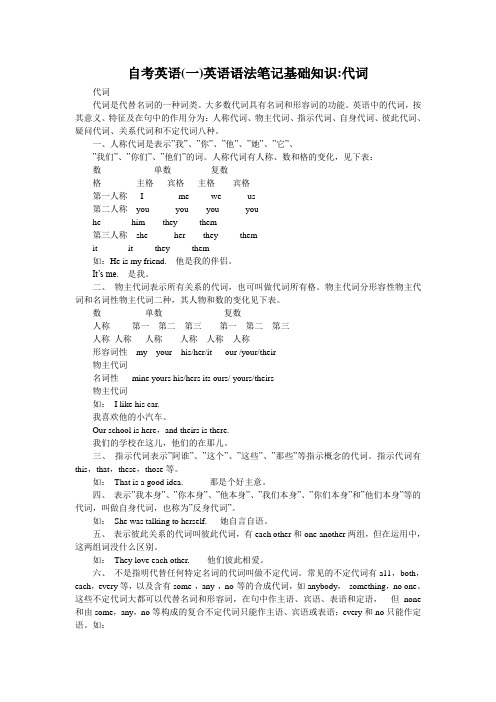
自考英语(一)英语语法笔记基础知识:代词代词代词是代替名词的一种词类。
大多数代词具有名词和形容词的功能。
英语中的代词,按其意义、特征及在句中的作用分为:人称代词、物主代词、指示代词、自身代词、彼此代词、疑问代词、关系代词和不定代词八种。
一、人称代词是表示”我”、”你”、”他”、”她”、”它”、”我们”、”你们”、”他们”的词。
人称代词有人称、数和格的变化,见下表:数单数复数格主格宾格主格宾格第一人称I me we us第二人称you you you youhe him they them第三人称she her they themit it they them如:He is my friend.他是我的伴侣。
It’s me.是我。
二、物主代词表示所有关系的代词,也可叫做代词所有格。
物主代词分形容性物主代词和名词性物主代词二种,其人物和数的变化见下表。
数单数复数人称第一第二第三第一第二第三人称人称人称人称人称人称形容词性my your his/her/it our /your/their物主代词名词性mine yours his/hers its ours/ yours/theirs物主代词如:I like his car.我喜欢他的小汽车。
Our school is here,and theirs is there.我们的学校在这儿,他们的在那儿。
三、指示代词表示”阿谁”、”这个”、”这些”、”那些”等指示概念的代词。
指示代词有this,that,these,those等。
如:That is a good idea.那是个好主意。
四、表示”我本身”、”你本身”、”他本身”、”我们本身”、”你们本身”和”他们本身”等的代词,叫做自身代词,也称为”反身代词”。
如:She was talking to herself.她自言自语。
五、表示彼此关系的代词叫彼此代词,有each other和one another两组,但在运用中,这两组词没什么区别。
自考学士学位英语考试复习资料(语法词汇短词阅读作文)
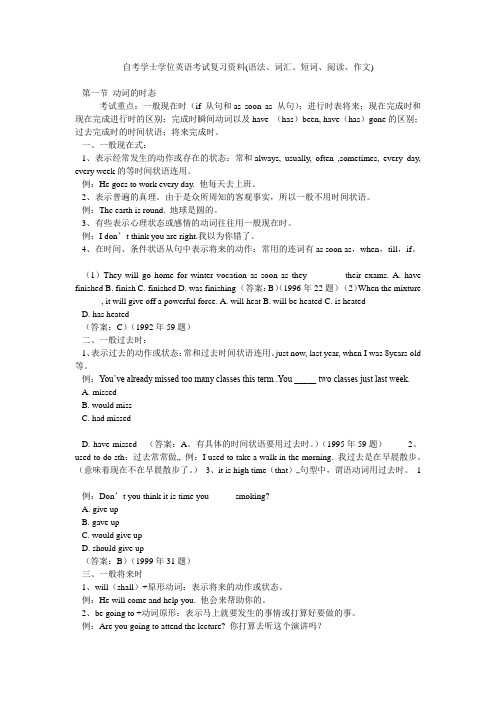
自考学士学位英语考试复习资料(语法、词汇、短词、阅读、作文)第一节动词的时态考试重点:一般现在时(if 从句和as soon as 从句);进行时表将来;现在完成时和现在完成进行时的区别;完成时瞬间动词以及have (has)been, have(has)gone的区别;过去完成时的时间状语;将来完成时。
一、一般现在式:1、表示经常发生的动作或存在的状态:常和always, usually, often ,sometimes, every day, every week的等时间状语连用。
例:He goes to work every day. 他每天去上班。
2、表示普遍的真理。
由于是众所周知的客观事实,所以一般不用时间状语。
例:The earth is round. 地球是圆的。
3、有些表示心理状态或感情的动词往往用一般现在时。
例:I don’t think you are right.我以为你错了。
4、在时间、条件状语从句中表示将来的动作:常用的连词有as soon as,when,till,if。
(1)They will go home for winter vocation as soon as they ________their exams. A. have finished B. finish C. finished D. was finishing (答案:B)(1996年22题)(2)When the mixture ______, it will give off a powerful force. A. will heat B. will be heated C. is heatedD. has heated(答案:C)(1992年59题)二、一般过去时:1、表示过去的动作或状态:常和过去时间状语连用。
just now, last year, when I was 8years old 等。
自考“英语(一)”课堂听课笔记第一章(1)
自考“英语(一)”课堂听课笔记第一章(1)Text A How to be a successful language learner?本课主要单词1. successful adj. 成功的He is a successful writer. (他是一个有成就的作家。
)He hopes he will be successful this time. (他希望他这次能够成功。
)success n. 成功Their film is a great success.(他们的影片很成功。
)We are sure of success. (我们必然能成功。
)succeed v. 成功I succeeded in getting the job. (我成功地得到了这份工作。
)She succeeded in passing the exam. (她考试及格了。
)2. adult adj. & n. 成年的,成熟的;成年人These adult films are not suitable for children.(这些成人电影,儿童不宜不雅看。
)Don’t worry too much about him, he is an adult now.(别为他过分担心,他是成年人了。
)3. disagree vi. 有不合,不同意;不符,不一致agree vi. 同意I disagree with you about this.〔对于这件事,我跟你的意见不同。
〕These figures disagree with last week’s results.(这些数据与上周的结果不符。
)I agree with what you said. (我同意你所说的。
)She agreed to the plan.(她赞成这个计划。
)We haven’t agreed on the date of the meeting.(我们还没商定会议的日期。
自考英语笔记一
Text A You Can't DO It Because It Hurts Nobody本课主要单词1. tough adj. 强壮的;粗暴的;老的;艰苦的1)The tough mountaineer succeeded in getting to the top of the mountain.(那位强壮的登山运动员成功地登上了山顶。
)2)Camels are tough and hardy creatures. (骆驼是能吃苦耐劳的动物。
)3)Those tough law-breaking youngsters should be dealt with seriously. (应该严肃对待那些无法无天的青少年。
)4)She complained about the tough steak.(她抱怨牛排太老。
)5)They had a tough time during the war. (战争期间她们苦熬度日。
)6)He'll be tough on you if you bother him. (如果你麻烦他,他会对你不客气。
)7)It was tough to get a satisfactory job.(找一份令人满意的工作很不容易。
)2. crime n. 罪;罪行criminal n. 罪犯adj. 犯罪的;刑事的1)He committed a crime against the security of the state. (他犯了危害国家安全罪。
)2)It is a crime to waste so much food. (浪费那么多食物是一种罪过。
)3)The president is determined to bring down the crime rate. (总统下决心使犯罪率下降。
)4)The wanted criminal had no place to hide. (被通缉的罪犯无处可藏。
自考现代英语语法重点
自考现代英语语法重点(总24页)-CAL-FENGHAI.-(YICAI)-Company One1-CAL-本页仅作为文档封面,使用请直接删除Chapter 1 The Structureof the English Sentence(第一章绪论)一、难点、重点1.Present the grammatical units that form a hierarchical order.(指出构成层次结构的语法单位.)英语句子的结构层次是:分句(clauses)、词组(phrases)、单词(words),图示如下:高级层次句子(由一个或多个分句组成)分句(由一个或多个词组组成)词组(由一个或多个词组成)低级层次词如果从语义的角度来考虑,单词以下还可再分为词素(morphemes);句子以上还有更大的语言单位,即把句子按一定逻辑规则组织起来的语篇。
所以,从超语法的角度来看,语法层次结构可以如下图所示:高级层次语篇(由广个或多个句子组成)句子(由一个或多个分句组成)分句(由一个或多个扣组组成)词组(由一个或多个词组成)词(由一个或多个词素组成)低级层次词素2. Morphemes词素 (Terms: morpheme, morph, allomorph, free morpheme and bound morpheme)(注:此部分内容的学习可以借鉴‘词汇学’的相关内容,然而必须注意两门课程描述的不同点。
)什么是词素(morpheme)词素是语法的最小区别性单位,即最低一级的语法单位。
词素的语音或拼写法的体现叫形素(morph)。
词素是一种抽象形式的成分,在不同的环境中一个词素可以由若干个不同的形素体现,如英语中的复数词素可以表现为/s,z,iz/。
某一词素在不同的环境中可以用不同的变体或词素变体(allomorph)表示。
所谓词素变体是指词素的非区别性变体,几个不同的变体一起构成一个词素。
词素又分为自由词素和粘附词素。
自考英语(一)课堂笔记完整版(50)
Unit25(第74讲—第76讲) 本课主要语⾔点 1. American men don't cry because it is considered not characteristic of men to do so. 动词consider的⽤法如下: ① Consider +宾语+宾补 They considered the attack a mistake. (他们认为这次进攻是错误。
) ② Consider +宾语+动词不定式 They considered themselves to be very lucking.(他们认为⾃⼰很幸运。
) ③ Consider +宾语+ as They don't consider it as important.(他们认为那个不重要。
) ④ Consider +宾语+形容词 They consider it wise not to criticize him.(他们认为不批评他是明智的。
) ⑤ Consider +宾语 He had no time to consider the matter.(他没有时间考虑这个事情。
) ⑥ Consider +V-ing He is considering changing his job.(他在考虑换⼀份⼯作。
) “be considered not characteristic of ……,” consider 在此处的⽤法当归于④。
be characteristic of 意思是 be typical of.如: 1)Carelessness and impatience are characteristic of him.(粗⼼、⽆耐⼼是他的特点。
) 2)Long winter and short spring are characteristic of the climate here.(冬天漫长,春天短暂是这⼉的⽓候特点。
- 1、下载文档前请自行甄别文档内容的完整性,平台不提供额外的编辑、内容补充、找答案等附加服务。
- 2、"仅部分预览"的文档,不可在线预览部分如存在完整性等问题,可反馈申请退款(可完整预览的文档不适用该条件!)。
- 3、如文档侵犯您的权益,请联系客服反馈,我们会尽快为您处理(人工客服工作时间:9:00-18:30)。
第一章绪论the structure of English sentence 1.0 introduction -- The grammar unites hierarchy
Higher
1.2 Words
1.2.1 Words Class
1.2.2 word formation 构词法
a. Affixation 词缀法List具体见书9-10页
英语分前缀后缀和中缀,前缀加在词根之前,改变词义不改变词类。
后缀加在词根之后,改变词类不改变
b. Composition 复合法
两个或者两个以上的独立词构成一个复合词。
E.g.: manservant, snowfall, deadline, spotlight, world-famous, before-tax, whenever, whereas…
c. Convention 转化法
某个单词未经添加此罪就由一个词类转化为另一个词类。
Verbs to nouns: love, answer, doubt.
Adj. to verbs: daily(=daily newspaper), final(=final exam)
d. Blending 拼缀法
把两个词经行裁剪,掐头去尾,然后把这两个不完整的部分拼成一个词,在某些情况下只裁剪两个词中的一个词,把一个不完整的词和一个完整的词拼成另一个词。
P+P Motel (Motor + Hotel)
Smog (Smoke + Fog)
Brunch (Breakfast + Lunch)
W+P newscast (News + Broadcast)
Workfare (Work + Welfare)
P+W Medicaid (Medical + Aid)
Medicare (Medical + Care)
e. Back-formation 逆生法
英语中有很多-or,-er结尾的名词是由动词派生而来,但也不乏通过去掉这些名词词尾派生出来的动词。
e.g. Housekeep –Housekeeper Babysit – Babysitter
f. Shortening 缩略法
把较长的多音节单词裁剪成较短的单音节单词。
e.g.: Ad (Advertisement) Phone( Telephone) Lab(Laboratory)
g. Acronyms 首字母省略法
两种发音方式,按字母发音或者按拼音方法读音。
e.g.: UFO, FBI, VIP
1.3 Phrases
词组是按一定的语法规则,围绕一个中心词结合起来的一组词,中心词所属的词类决定词组类别及组合方式。
A phrase consists of one or more that one word, usually a string of words built up around a head word.
类别:Noun Phrase, Verb Phrase, Adjective Phrase, Adverb Phrase, Prepositional Phrase 1.3.1 The Noun Phrase 名词词组
名词词组以名词为中心词,并可能带有一个或几个修饰语。
(可以是词,词组,分句,可前置后置)
My neighbor is a noisy person. (determiner + adj + headword)
1.3.2 The Verb Phase 动词词组
以动词为中心,并可能带有助动词。
没有助动词的叫简单动词词组,有助动词的叫复杂动词词组。
The simple Verb Phrase and Complex Verb Phrase
She bought a book yesterday. (Simple)
I have never seen him before. (Complex)
根据其结构和功能又可分为限定动词词组(finite verb phrase)和非限定动词词组(non-finite verb phrase). 第一个动词为限定动词的词组叫做限定动词词组,主要特征是与主语保持数的一致并有时的标志。
第一个动词为非限定动词的词组叫做非限定动词词组,即动词不定式,-ing分词,-ed分词
The finite Verb Phrase and The non-finite Verb Phrase
The head word or the first element of a finite verb phrase is a finite verb, which bears the tense marker and sometimes keep in concord with the subject.
EX: She likes coffee.
The non-finite Verb Phrase is a phrase whose first element is a non-finite verb free of the constraints. Including -ing & -ed participle.
EX: I didn't expect you to be here.
1.3.3 The Adjective Phrase 形容词词组
以形容词为中心词,并可能带有前置或后置修饰语,前置语一般是副词,后置除福此外可以是词组或者分句。
I didn’t find the language difficult to learn. (head word + infinitive)
1.3.4 The Adverb Phrase 副词词组
副词词组以副词为中心词,组合方式是修饰语加副词,有时中心词之后还可以带有后置修饰语或补足成分。
He doesn’t work very hard indeed. (adv + headword + adv)
1.3.5 The Prepositional Phrase
介词词组以介词为中心词,通常为介词加名词词组组成。
There are a lot of people in the office. (headword + noun phrase)
1.4 Clause 分句
1.4.2 Clause Patterns Seven Clause Patterns:
SV: Subject + Verb I run.
SVC: Subject + verb + Complement I run fast.
SVO: Subject + Verb + Objective I read a book
SVOO: Subject + Verb+ Objective + Objective I give her a book.
SVOC: Subject + Verb + Objective + Complement I find the book interesting. SVA: Subject + Verb +Adverbial I live in Shanghai
SVOA: Subject + Verb +Objective +Adverbial I put my cloth into the closet.
1.5 Sentence
句子由一个或几个分句组成,有简单分句,并列分句。
并列和从属分句组成的叫复杂句。
既含并列又含从属的句子叫并列复杂句。
Simple Sentence: Contains one clause.
Compound Sentence: Contains more the one clause, the clauses related to one another by coordination.并列
Complex Sentence: Contains more the one clause, the clauses related to one another by subordination. 从属。
